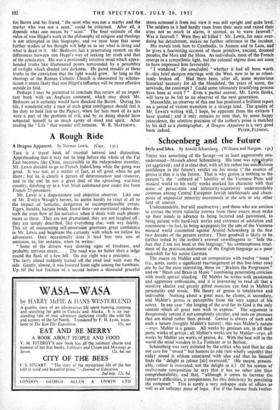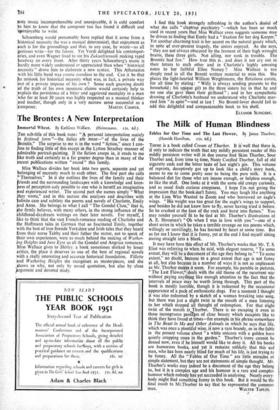Schoenberg and the Future
THERE was something of the Savage—or at least aggressively mis- understood—Messiah about Schoenberg. His tone was apos,alyptic yet aggrieved ; and it is clear that, with all his rather too ostentatious confidence in the future's verdict on his music (" the essence of genius is that it is the future. That is why genius is nothing to the present "), the " unheard of " hostility of the Viennese Press and musical world to his early works marked his character with that sense of persecution and inferiority-superiority understandably common among Central European Jewish intellectuals and cham- pions of unpopular minority movements in the arts or any other field of interest.
'Understandable, but still unattractive ; and-those who are anxious to extract the often valuable essence from these essays must make up their minds in advance to being lectured and patronised, to being patient with hard-luck stories and extremes of adulation and resentment—in fact, to being scapegoats for the sins of the Viennese musical world committed against Arnold Schoenberg in the first two decades of the present century. Their goodwill is likely to be further tested by the author's avowed unwillingness to " hide the fact that I am not born in this language," his contemptuous treat- ment of the precision-instrument of the English language as a poor makeshift for his native German. '
The essays on Mahler and on composition with twelve " tones " (i.e., notes, surely a significant rearrangement of this five-letter row) are by far the most interesting, those on " Brahms the Progressive " and on " Heart and Brain in Music " combining penetrating criticism with much special pleading. Of Mahler he writes with passionate and aggressive enthusiiim, and it is interesting to read all that a sensitive idealist and greatly gifted musician can find in Mahler's personality and music. His theory of genius is totalitarian and indivisible. Nothing about a great man, he claims, is secondary, and Mahler's genius is perceptible from the very aspect of his scores. In any case " the lOnging of the scul for its God is the only content which all great men wish to express." The argument is dangerously rotund if not completely circular, and rests on premises that are stated rather than proved. Genius is always of such and such a nature (roughly Mahler's nature) • this was Mahler's nature —ergo, Mahler is a genius. All works by geniuses are, in all their parts, works of geniui ; all Mahler's works are by Mahler—ergo, all works by Mahler are works of genius, &c. With the' best will in the world the mind wanders to La Fontaine or to Berlioz.
Schoenberg was very irritated by the critics who said that he did not care for " sound " but hastens to add (not wholly unjustly) that today sound is seldom associated with idea and that he himself finds the " delight in colour [sic] overrated." (He means, presum- ably, colour is overrated, not the delight in it.) Of his system of twelve-note composition he says that it has no other aim than comprehensibility, and that, " although it seems to increase the listener's difficulties, it compensates for this deficiency by penalising the composer." This is surely a very unhappy state of affairs as well as an unhappy piece of logic. For if the listener finds twelve-
note music incomprehensible and unenjoyable, it is -cold comfort to him to know that the composer too has found it difficult and *enjoyable to write.
Schoenberg would presumably have replied that it arose from a historical necessity (he was a musical determinist), that enjoyment as such is for the groundlings and that, in any case, he wrote—as all geniuses write—for the future. Yet Verdi delighted his contempor- aries, and even Wagner lived to see his Zukunftsmusik making rapid headway on every front. After thirty years Schoenberg's music is hardly more widely understood or appreciated than when " historical necessity " drove him to elaborate a new syntax. This Athanasius with his little band wad contra mundum to the end. Can it be that ie mistook for historical necessity what was, in fact, a private way out of a private impasse of his own ? Some such gnawing doubt of the truth of his own messianic claims would certainly help to (explain the persistence of a bitter and aggrieved mentality in a man who for at least 30 years was highly respected as a musical thinker land teacher; though only in a very narrow sense successful as a



































 Previous page
Previous page